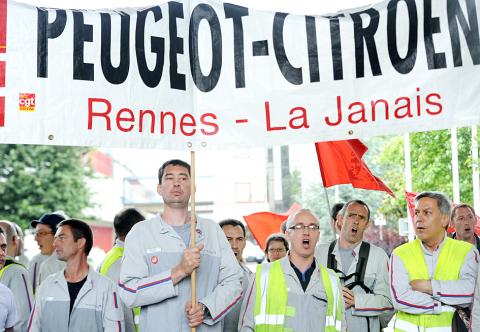PSA Peugeot Citroen’s decision to close a factory and cut an additional 8,000 jobs is unacceptable, French President Francois Hollande has said, pledging to lean on Europe’s second-biggest carmaker to renegotiate the plan.
Peugeot said on Thursday that it is to cut a total of 14,000 jobs and shut an auto plant in France for the first time in two decades to stem widening operating losses.
“The plan in the current state is not acceptable,” Hollande said on Saturday on French television.

Photo: AFP
Hollande was elected in May, promising to prevent a “parade of firings” after the election.
Peugeot’s shares plunged 7.7 percent on Friday on concern that the government may amend Peugeot’s decision to reduce costs and trim production, but there is not much wiggle room to do so, said Antonio Barroso, an analyst at the global risk research and consulting firm Eurasia Group in London.
“The range of options is limited,” Barroso said. “The Peugeot crisis is a powerful reminder of one of the most important problems facing France, which is lack of competitiveness.”
Hollande said he will consider incentives to spur sales of environmentally friendly cars and study the possibility of providing credit for vehicle purchases, though he will not adopt cash incentives like former French president Nicolas Sarkozy’s administration did to counter a recession in 2009.
With jobless claims at a 12-year high and the unemployment rate at 10 percent, Hollande said that generating jobs is his top priority. Besides Peugeot, companies including Air France-KLM Group, Carrefour and drugmaker Sanofi are mulling staff reductions in the face of stalling economic growth.
“It’s true we have a competitiveness problem,” Hollande said on Saturday. “There is an effort to be made, but it needs to be shared fairly.”
The government wants to avoid cutting salaries, but is considering shifting some social charges currently paid by employers to the social charges tax, which is paid on all forms of income including wages, pensions and capital gains.
The economic situation is already costing the Socialist president politically. Support for Hollande has dropped 7 points in the past month to 56 percent, according to an IFOP poll published on Wednesday. The survey of 1,005 voters has a margin of error of about 3 percentage points.
“Peugeot is an emblematic case that will leave its mark on people,” said Jerome Fourquet, a pollster at IFOP in Paris. “The political stakes are huge.”
Peugeot, Renault SA and Fiat SpA have posted the biggest sales declines this year in Europe, where Peugeot now expects the car market to contract 8 percent. The French carmaker has been consuming about 200 million euros (US$245 million) in cash monthly since the middle of last year.
The company will stop production at its 39-year-old factory in Aulnay, on the outskirts of Paris, in 2014. It will also lower production at a plant in Rennes to slash operational costs.

BYPASSING CHINA TARIFFS: In the first five months of this year, Foxconn sent US$4.4bn of iPhones to the US from India, compared with US$3.7bn in the whole of last year Nearly all the iPhones exported by Foxconn Technology Group (富士康科技集團) from India went to the US between March and last month, customs data showed, far above last year’s average of 50 percent and a clear sign of Apple Inc’s efforts to bypass high US tariffs imposed on China. The numbers, being reported by Reuters for the first time, show that Apple has realigned its India exports to almost exclusively serve the US market, when previously the devices were more widely distributed to nations including the Netherlands and the Czech Republic. During March to last month, Foxconn, known as Hon Hai Precision Industry

Taiwan Semiconductor Manufacturing Co (TSMC, 台積電) and the University of Tokyo (UTokyo) yesterday announced the launch of the TSMC-UTokyo Lab to promote advanced semiconductor research, education and talent development. The lab is TSMC’s first laboratory collaboration with a university outside Taiwan, the company said in a statement. The lab would leverage “the extensive knowledge, experience, and creativity” of both institutions, the company said. It is located in the Asano Section of UTokyo’s Hongo, Tokyo, campus and would be managed by UTokyo faculty, guided by directors from UTokyo and TSMC, the company said. TSMC began working with UTokyo in 2019, resulting in 21 research projects,

Ashton Hall’s morning routine involves dunking his head in iced Saratoga Spring Water. For the company that sells the bottled water — Hall’s brand of choice for drinking, brushing his teeth and submerging himself — that is fantastic news. “We’re so thankful to this incredible fitness influencer called Ashton Hall,” Saratoga owner Primo Brands Corp’s CEO Robbert Rietbroek said on an earnings call after Hall’s morning routine video went viral. “He really helped put our brand on the map.” Primo Brands, which was not affiliated with Hall when he made his video, is among the increasing number of companies benefiting from influencer

Quanta Computer Inc (廣達) chairman Barry Lam (林百里) yesterday expressed a downbeat view about the prospects of humanoid robots, given high manufacturing costs and a lack of target customers. Despite rising demand and high expectations for humanoid robots, high research-and-development costs and uncertain profitability remain major concerns, Lam told reporters following the company’s annual shareholders’ meeting in Taoyuan. “Since it seems a bit unworthy to use such high-cost robots to do household chores, I believe robots designed for specific purposes would be more valuable and present a better business opportunity,” Lam said Instead of investing in humanoid robots, Quanta has opted to invest